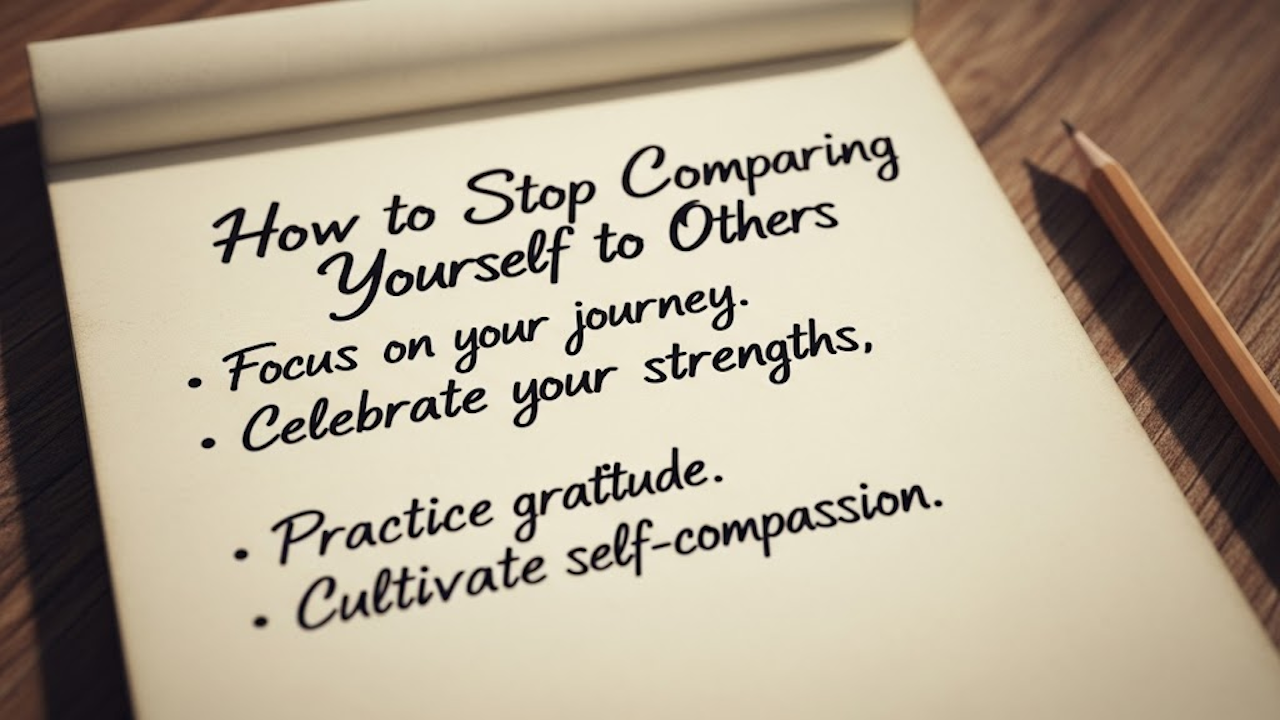It’s a deeply ingrained human tendency, this act of measuring ourselves against the yardstick of others’ perceived successes and highlight reels. From a young age, we are often subtly (and sometimes not so subtly) encouraged to compare grades, achievements, and even appearances. In the age of social media, this tendency has been amplified exponentially, creating a breeding ground for feelings of inadequacy, envy, and a persistent sense that we are somehow falling short. However, this constant comparison is a thief of joy, a drain on our energy, and a significant barrier to self-acceptance and personal growth.1 Learning to break free from this cycle is not just beneficial; it’s essential for cultivating genuine happiness and a healthy sense of self-worth.2
The first crucial step in dismantling the habit of comparison is cultivating awareness. We often engage in this behavior unconsciously, scrolling through feeds and making mental notes of who has achieved what, who looks a certain way, or who seems to be living a life that appears more exciting or fulfilling than our own. Start paying attention to when these thoughts arise. What triggers them? Is it a specific person, a certain type of post, or a particular situation? Recognizing these triggers is the first line of defense. Once you become more attuned to when you are comparing yourself, you can consciously choose to interrupt the thought pattern.
One of the most insidious aspects of comparison is that it rarely provides an accurate or complete picture. We are typically seeing the curated “highlight reel” of others’ lives, the carefully selected moments they choose to share.3 We don’t see the struggles, the setbacks, the doubts, or the hard work that lies beneath the surface of their achievements. Comparing our “insides” – our full spectrum of emotions, vulnerabilities, and daily realities – to someone else’s carefully constructed “outside” is inherently unfair and will almost always leave us feeling lacking.4 Remind yourself that everyone faces challenges, even those who seem to have it all.
Social media, in particular, warrants a conscious and critical approach. While it can be a tool for connection and information, it is also a powerful engine for social comparison. The constant exposure to idealized versions of reality can warp our perceptions and fuel feelings of inadequacy.5 Consider taking a break from social media or consciously curating your feed. Unfollow accounts that consistently trigger negative comparisons and instead focus on content that inspires, educates, or brings you genuine joy. Set boundaries around your social media usage and be mindful of how it impacts your mood and self-perception.
Shifting your focus from external validation to internal growth is paramount. Instead of measuring yourself against others, turn your attention inward. What are your personal values, goals, and aspirations? What truly matters to you? Define your own metrics for success and progress based on your unique journey and circumstances. Celebrate your own milestones, no matter how small they may seem, and acknowledge the effort and resilience you have demonstrated. Comparing yourself to your past self – recognizing how far you’ve come and the progress you’ve made – can be a powerful motivator and a source of genuine pride.
Cultivating gratitude for what you already have is a potent antidote to the comparison trap. When we focus on the things we lack or perceive others to possess, we often overlook the abundance in our own lives. Take time each day to appreciate the people, experiences, and resources you have. This practice shifts your perspective from a place of scarcity to one of abundance, fostering contentment and reducing the urge to compare. Keeping a gratitude journal or simply taking a few moments each day to reflect on what you are thankful for can make a significant difference.
Furthermore, actively celebrating the successes of others can help dismantle feelings of envy and foster a sense of connection rather than competition.6 Recognize that someone else’s achievement does not diminish your own worth or potential. Instead, choose to be inspired by their journey and learn from their experiences. When you genuinely celebrate the good fortune of others, you cultivate a more positive and supportive mindset, which ultimately benefits your own well-being.
Finally, remember that your journey is unique and unfolds at its own pace. There is no universal timeline for success, happiness, or fulfillment. Embrace your individuality, your strengths, and even your imperfections. Focus on cultivating self-compassion and acceptance. Treat yourself with the same kindness and understanding you would offer a friend. When you are rooted in self-acceptance, the need to compare yourself to others diminishes, allowing you to embrace your own path with confidence and joy.7 Breaking free from the comparison trap is an ongoing process, but with conscious effort and a shift in perspective, you can cultivate a more authentic and fulfilling life, defined by your own values and celebrated for your unique journey.


